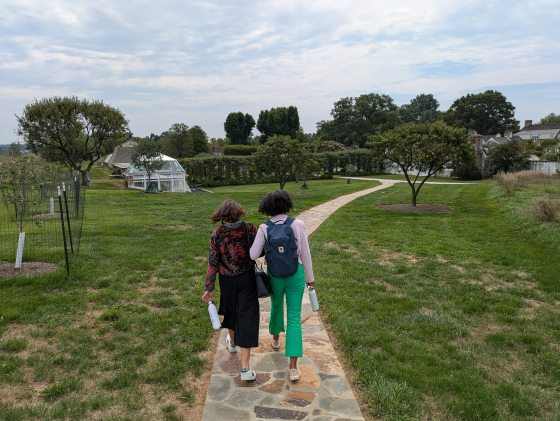Focused on preparing high-potential professionals for high-impact roles in public horticulture, our Fellows Program is a unique leader-development program and immersive living and working experience. Central to the program is providing ample opportunity for our Fellows to immerse themselves in leader education. As such, our Fellows engage in formal salon-style discussions hosted by regional public horticulture organizations. During these salons, the Longwood Fellows learn firsthand from such experts—all while continuing their own journey in preparing for high-impact roles in public horticulture. On a recent trip to Washington DC, our 2024–25 Fellows cohort visited a number of gardens in an endeavor that not only allowed them to witness the remarkable diversity among the region’s cultural destinations—but also engage in a collective experience in which they could contribute diverse perspectives.
Coming to Longwood from California, Florida, New Zealand, Brazil, and New York City, our Fellows have a wide range of professional experiences and interests, ranging from plant discovery to landscape design. Yet despite these varied backgrounds, they share a commitment to changing the world of public horticulture, and are also enjoying their Fellows Program experience together. As Fellow Vânia Pereira shares, “Traveling as a cohort was an incredibly rewarding experience, allowing us to share unforgettable moments while exploring extraordinary gardens.” Fellow Anastasia Sallen agrees: “We got to see the city through each other’s observations,” she shares. “We learned through each other’s questions.”

Fellow E. Yvette Weaver (left) and Oak Spring Garden Foundation Head Gardener Allissa Montgomery admire trompe l’oeil paintings at Oak Spring Garden Foundation. Photo provided by Anastasia Sallen.
While in Washington DC, the Fellows engaged in comprehensive tours and salon-style discussions with an impressive slate of organizations, including Hillwood Estate, Museum & Gardens; the United States Botanic Garden; National Arboretum; Capitol Grounds and Arboretum; Smithsonian Gardens; and the Oak Spring Garden Foundation. During each salon experience, our Fellows delved into their innerworkings, including their approach to management styles and staff engagement, relationships with the federal government, funding structures, and operations within the nation’s capital.

Capitol Grounds and Arboretum Deputy Director Francisco J. de la Mota (center) points out changes to the Capitol campus over time. Photo provided by Anastasia Sallen.
To Sallen, who comes to the Fellows Program from Sarasota, Florida, the experience brought concepts closer to home. “Coming from Florida, a place that is a vacation destination, I appreciated seeing the ways in which gardens in DC are thinking about their local, regional, national, and global visitors,” she shares. “We had some really productive conversations about balancing the realities of being in a high-traffic environment with providing a dynamic and inspiring landscape.”
From observing a bonsai at the National Arboretum that has been in training since 1625, to using a stereoscope viewer at the Smithsonian’s Archives of American Gardens, to experiencing the National Air and Space Museum’s wind garden that showcases wind-dispersed plants and related botanical and scientific stories, our Fellows were taken with—and inspired by—the complexities of each organization. Fellow Laurel Dunning, for one, was struck by the level of detail and care given to the historic landscape of the Capitol Grounds and Arboretum. “I was really impressed to learn that the Capitol Grounds, a Level III arboretum, is home to 4,800 trees, all of which are inspected annually. We learned how this team serves the needs of Congress while maintaining public access to these historic grounds, which are open 24 hours a day, seven days a week.” Pereira agreed. “Observing how these organizations handle daily operations in one of the most frequented areas of the country provided crucial insights into their challenges and strategies,” she shares. “Each garden operated with its own distinctive governance and leadership style, which was fascinating to observe.”

Fellow Laurel Dunning uses a stereoscope viewer at the Smithsonian’s Archives of American Gardens. Photo provided by Laurel Dunning.
Even with distinctive governance and leadership styles, each destination demonstrated a common thread. “The organizations we visited each had a clear mission and vision, and they demonstrated the agility and ability to adapt when necessary,” adds Fellow Clare Shearman. “Witnessing this was a key learning experience for my leadership journey.”

Fellow Clare Shearman takes a behind-the-scenes tour—and gets misted—at Hillwood Estate, Museum & Gardens. Photo provided by Clare Shearman.
Traveling together as a cohort was also a key experience for our Fellows. “Visiting gardens together offers valuable new perspectives,” continues Shearman. “These visits have been invaluable, allowing our cohort to reflect on and discuss the diverse leadership styles we’ve been exposed to, and identify which approaches most resonate with us.”
Sallen cites inspiration she found during one such visit. “I am always looking for interesting approaches to engagement with garden spaces and I really enjoyed the depth of the residency model at Oak Spring Garden Foundation,” she shares. “Oak Spring President Sir Peter Crane shared a lovely quote from Bunny Mellon, whose gifts and ideas are shared by the foundation: ‘Part of creating is understanding there is always more to do; nothing is ever completely finished.’ I will carry that quote with me as I continue to learn and grow through the Fellows Program and beyond.”

Fellows Vânia Pereira and E. Yvette Weaver at Oak Spring Garden Foundation. Photo provided by Anastasia Sallen.


